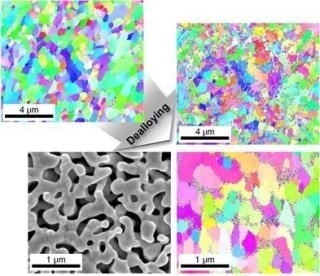Mar 29 2016
Prof. Ju-Young Kim (School of Materials Science and Engineering)’s research team developed an ultralight nanoporous gold with high strength. This newly developed material is twice more solid than a regular gold and it is 30% lighter. This research outcome was selected to introduce on the online version of Nano Letters on March 22, 2016.
 These are SME images that show the formation of nanoporosity in free corrosion dealloying for gold samples. (credit: UNIST)
These are SME images that show the formation of nanoporosity in free corrosion dealloying for gold samples. (credit: UNIST)
Prof. Kim says “This nanoporous gold has 100,000 wider surface than a regular gold and it is harmless to humans since it is chemically stable. As long as we overcame the fact of easily breaking quality, it will be used in various research areas.”
This gold loses its original gloss, therefore it looks black. So it’s called Black Gold. Black gold has a structure with many holes, but with strength and durability. The porous materials are not difficult to elevate the reaction efficiency since they have wider surfaces than their sizes. However, if there are more holes, then it would get more difficult to use in various areas with weaker strength.
Prof. Kim’s team used a ball milling technique to elevate the strength of nanoporous gold. This newly developed nanoporous gold maintains the good qualities of the regular gold, so it is possible to be used in various ways after coating it with various ingredients on the surface.
Prof. Kim says, “With this research outcome, it is now possible to raise the credibility of nanoporous ingredients and apply them to the various elements.”